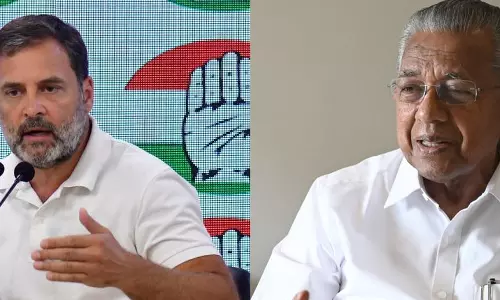
A hike in pay alone insufficient
text_fieldsThe recommendations of the seventh Pay Commission which was submitted on Thursday allowing for significant increase in pay and likely to benefit the employees and the pensioners haven’t gone down well with the staffers.
The Commission recommended a 23.55 per cent increase in their salary, allowances and pension that would benefit 47 lakh staffers and 52 lakh pensioners involving an additional burden of Rs 1.02 lakh crore on the exchequer. The hike will be effective from January 1, 2016. There was a 40 per cent increase the previous time through the sixth Pay Commission which was reduced to 23.55 per cent due to the financial crunch. How the additional expenditure would be tackled is yet to be seen. The Centre anticipates that an increase in pay would lead to an increased consumption and thereby to increased economic dealings and that the additional outgo would be solved by the jump in the national revenue. But according to the trade unions, the recommended increase in pay isn’t sufficient and some argue that the 23.55 per cent increase would only come up to around 16 per cent when implemented. While the senior staffers receive fair allowances, those at the lower levels do not get the sufficient increase required to meet the current inflation. At the same time, the rating agencies are concerned whether the hike in pay would topple the attempts of the Reserve Bank and the Centre to control inflation and reduce fiscal deficit. An increase in pay for all times is essential. Since the staffers are paid for their services, their social commitment as well as efficiency should also be considered along with the income. There should be a proper system to evaluate the expertise of the employees according to the Right to Information Act and Right to Services Act and to also link it to pay and promotion. When the employees are organized and the public, their deemed judges, are unorganized, there should be a specific criteria in this case. The condition of the large communities who are ignored merely because they are unorganized could also not be neglected. Our agricultural sector has been in crisis for a while. So are the small scale industries and production sector.
The Pay Commission considered 99 lakh people including Government employees and former staffers. On the other hand, more and more farmers are being marginalized. This was pointed out by the second National Convention of the farmers union that met in Bangalore. They urged to temporarily stop implementing the suggestions of the Pay Commission and to ensure fairness between the employees and farmers. The criteria like food, clothing, shelter and other essential expenses on which the hike in pay is based, are applicable to farmers as well. Shouldn’t the 23.55 per cent increase granted to the employees be brought in the normal price of agricultural crops as well? But the Centre recently rejected the Swaminathan Committee report that urged to ensure 50 per cent profit to the farmers. Modi government permitted only a normal price of Rs 50 per quintal for rice and wheat crops last year. This increase that comes up to 3.6 per cent is not sufficient to meet the inflation. The hike of Rs 75 brought about in the current fiscal year is also totally insufficient. According to a 2014 report, an average farmer family gets Rs 3078 per month from agriculture which would be Rs 6000 if the allowance from the Employment Guarantee Act is added to it. With the seventh Pay Commission recommendations implemented, the farmers would not just be getting one third of that amount but would also have to bear the burden of the increasing price hike. While the minimum wage in 1986 was Rs 750, today it would be Rs, 18, 000. The normal price of wheat was Rs 315 per quintal. It should be made Rs 7505 according to the new hike in pay. But only a mere Rs 1525 is announced for the year 2015-16. The economic gap is widening in other unorganized sectors as well. Only when the revenue of the other unorganized sectors increase proportionally with the salary of the employees would the society grow. Let there be revenue commissions for them similar to the Pay Commission.























